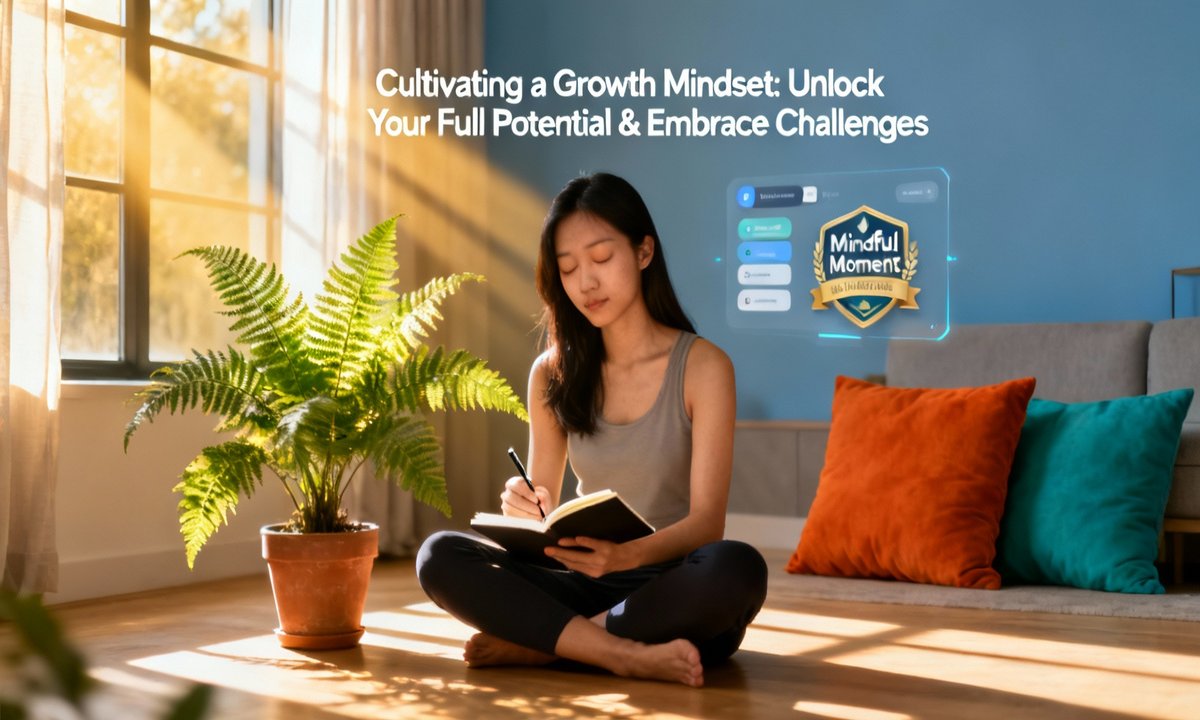Why do some people thrive under pressure, while others retreat? The secret often lies in mindset—not talent, luck, or even effort. Cultivating a growth mindset empowers you to embrace challenges, see setbacks as stepping stones, and unlock your truest potential. Adopting this mindset is a powerful predictor of lifelong success and well-being.
Understanding the Growth Mindset
A growth mindset describes the belief that abilities and intelligence can be developed through effort, learning, and perseverance. In contrast, a fixed mindset assumes talents are set in stone, leading to different responses to challenges. This subtle mental shift opens doors to new possibilities.
With a growth mindset, mistakes become opportunities for learning, and persistence becomes a powerful asset. This perspective is available to anyone, at any age, fostering continuous personal development. It encourages seeing every experience as a chance to grow and improve.
The Science Behind Growth
Embracing a growth mindset offers compelling, science-backed benefits. Research indicates it leads to enhanced learning capabilities, reduced stress levels, and greater overall resilience. This approach is linked to improved academic performance for students.
For adults, a growth mindset can boost creativity and sharpen problem-solving skills. Crucially, it cultivates grit—an unwavering passion and perseverance toward achieving long-term goals. Explore how mindset shifts can even impact money management with our guide on frugal living hacks for financial freedom.
Overcoming Fixed Mindset Thinking
How can one recognize if a fixed mindset is creating limitations? Listen for internal dialogue such as, “I’m just not good at this,” or “I’d rather not try than fail.” These thoughts act as subtle barriers to progress.
Instead, consciously reframe these limiting beliefs. A simple yet powerful technique is to add “yet” to the end of a negative statement, transforming “I can’t do this” into “I can’t do this—yet.” This signals to the brain that growth and future capability are possible, sparking curiosity and action.
Embracing Challenges for Progress
Feeling apprehensive or afraid of making mistakes often signals resistance from a fixed mindset. Rather than avoiding new or difficult situations, growth-minded individuals view challenges as essential learning opportunities. This perspective turns potential obstacles into pathways for development.
Consider actively seeking out unfamiliar tasks or projects, even if they initially cause nervousness. Remember that every challenge, regardless of its size, plants a seed for future successes and personal evolution.
Transforming Setbacks into Feedback
While nobody enjoys experiencing failure, a growth mindset empowers individuals to convert setbacks into valuable feedback. The key lies in asking reflective questions: “What can be learned from this experience?” or “Which skill might need strengthening?”
This analytical approach can rewire disappointment into renewed motivation. For boosting resilience in other aspects of life, exploring decluttering solutions can help regain a sense of control, especially during overwhelming times.
Reframing Effort as a Strength
A fixed mindset might suggest that if something is hard, one is simply not suited for it. Conversely, a growth mindset champions effort as the primary driver of mastery and achievement. Consistent effort is celebrated as the engine of personal development.
Top performers across various fields consistently demonstrate the power of showing up, learning from mistakes, and persisting through challenges. Viewing effort as a form of mental training, where each repetition builds strength, boldness, and wisdom, can be transformative.
The Power of Curiosity and Lifelong Learning
Curiosity is an essential ingredient for a thriving growth mindset. When feeling stuck in routine, cultivate a habit of asking more questions, actively seeking feedback, and experimenting with new approaches. This openness fuels continuous improvement.
For enhancing well-being at home, experimenting with eco-chic decor can not only transform living spaces but also influence daily mindset. This demonstrates how embracing change can be both aesthetically pleasing and personally enriching.
Seeking New Tools and Perspectives
Those with a growth mindset are often inclined to find innovative solutions for daily challenges. Integrating smart home gadgets, for instance, can represent a modern way to learn and grow in the digital landscape. These tools can simplify aspects of life.
Discovering which smart gadgets simplify your life without adding unnecessary clutter or complexity is an example of applying a growth-oriented approach to practical living.
Embracing Feedback as a Catalyst
Feedback should be viewed not as criticism, but as valuable information crucial for growth. Individuals who excel tend to actively seek honest reflections and then apply these insights to improve. This proactive engagement propels development.
Instead of avoiding constructive input, consider asking mentors, colleagues, or teachers, “What’s one thing I could do better?” Embracing these responses can serve as powerful keys to unlock the next level of personal and professional capability.
Fostering Growth in Daily Life
Cultivating a growth mindset begins with small, consistent daily habits. Choose one specific area of life, such as parenting, cooking, or managing home energy, where you desire improvement. Setting achievable goals and celebrating every step of progress reinforces this belief.
Begin by optimizing your living space or focusing on cutting utility bills. These small wins provide concrete evidence that positive change is always within reach, building confidence for larger transformations.
Creating a Growth-Rich Environment
Your surroundings significantly impact your mindset. Intentionally seek out people who encourage personal growth, share their stories of perseverance, and celebrate the process of learning over the pursuit of perfection. A supportive network can be invaluable.
Design physical spaces at home or work that foster experimentation and reduce the fear of making mistakes. Drawing inspiration from trendy DIY decor ideas can encourage an iterative approach of trying, tweaking, and refining.
Practicing Mindful Self-Compassion
A growth mindset flourishes when coupled with self-compassion. When faced with setbacks, acknowledge the inner critic, but consciously choose kindness and understanding. Remind yourself that genuine growth involves making mistakes, learning from them, and continuing to move forward, rather than demanding constant perfection.
Incorporating moments of calm or taking intentional breaks can further strengthen your ability to bounce back gracefully after encountering challenges. This gentle approach supports long-term resilience.
Growth Mindset in Work and Well-being
Beyond personal development, a growth mindset forms the bedrock of professional success. In a work environment, individuals who actively seek feedback, willingly undertake challenging projects, and maintain an openness to continuous learning are typically more likely to advance and find satisfaction in their careers.
For ways to manage time and reduce stress, exploring must-have kitchen tools for easy recipes illustrates how the right mindset combined with practical resources can unlock new potential, even in routine tasks.
Mindset, Stress, and Mental Health
Approaching setbacks with a growth mindset can fundamentally alter how one responds to stress, enhancing resilience and adaptability. Studies suggest that a belief in one’s capacity to learn can reduce anxiety and promote healthier coping mechanisms. This internal strength is vital for navigating life’s complexities.
Pairing growth mindset practices with strategies like decluttering or creating nurturing home environments—perhaps by adding health-boosting indoor plants—can further support overall mental and emotional well-being.
Trusting the Process When Progress Slows
It is important to remember that growth is rarely a linear journey. Periods of slow progress, moments of doubt, and plateaus are all natural components of the development process. Recognizing this can alleviate frustration and maintain motivation.
Celebrating incremental achievements, no matter how small, reinforces the belief that every effort contributes to forward momentum, even when results are not immediately apparent. Reflecting on past successes can often rekindle motivation during challenging times.
Practical Steps for Cultivating a Growth Mindset
Here are actionable steps to integrate a growth mindset into your daily life:
- Recognize Fixed Mindset Triggers: Become aware of instances when you avoid challenges or talk yourself out of new experiences.
- Practice “Yet”: When encountering a struggle, consciously add “yet” to any negative self-talk, signaling future potential.
- Seek Feedback Frequently: Actively welcome input from others and commit to acting on the valuable insights received.
- Reframe Failure: View every mistake as a source of information and an opportunity for learning, rather than a permanent limitation.
- Celebrate Small Wins: Acknowledge and give yourself credit for the effort expended, not solely for the final outcomes achieved.
- Surround Yourself with Growth-Minded Allies: Foster relationships with individuals who encourage your development and support a learning-oriented perspective.
For additional habit-building insights that reinforce a growth mindset and can also lead to financial benefits, explore frugal living for financial freedom or discover budget-friendly meal prep solutions.
Mindset and Sustainable Living
The foundational principles of a growth mindset naturally resonate with eco-friendly and sustainable lifestyles. Both approaches emphasize continuous, small improvements and a willingness to embrace challenges for a greater collective good. This synergy promotes thoughtful evolution.
If you are looking to reduce energy consumption and costs, adopting smart home energy savers exemplifies experimenting with new tools and habits. This demonstrates how shifts in mindset can yield practical, environmentally conscious rewards.
Insights from Research
Extensive research underscores that intelligence is not a fixed attribute; rather, it can be developed through diligent effort, strategic approaches, and constructive feedback. This perspective highlights the dynamic nature of human potential.
Further studies indicate that qualities such as grit and perseverance, which are key characteristics of a growth mindset, are often more predictive of achievement than inherent talent alone. These findings emphasize the power of dedication and sustained effort. Learn more about this research. Explore the power of grit.
Conclusion: Embrace the Journey of Possibility
Unlocking your full potential is an ongoing journey, not a singular event. By consciously embracing a growth mindset, you gain the power to transform obstacles into valuable opportunities, cultivate deep resilience, and purposefully shape a life rich with possibilities.
Ready to take your initial step? Choose one area you have been avoiding and approach it with genuine curiosity and a willingness to learn. Your possibilities are only just beginning to unfold. Consider exploring our ultimate guide to frugal, empowered living for additional inspiration on your path to growth.



